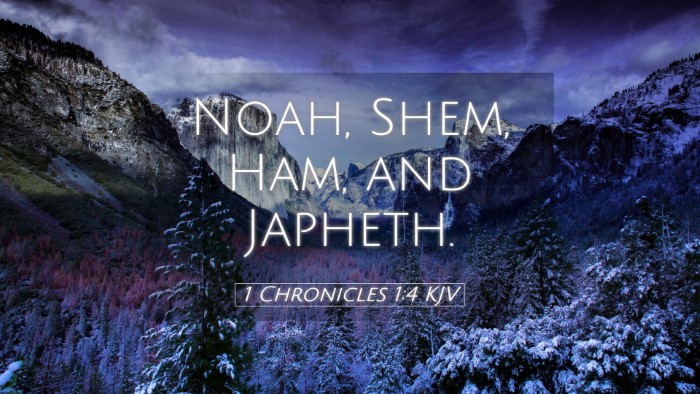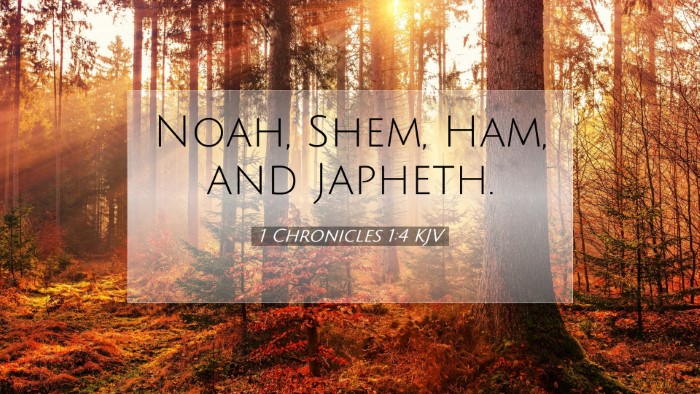Commentary on 1 Chronicles 1:4
Text of the Verse: "Noah, Shem, Ham, and Japheth." - 1 Chronicles 1:4 (ESV)
Introduction
The book of Chronicles is significant in the biblical narrative for its genealogical records and historical accounts.
It aims to provide a historical summary of Israel, tracing the lineage from Adam down to the post-exilic community.
In this context, 1 Chronicles 1:4 introduces one of the pivotal figures in biblical history: Noah, along with his sons Shem, Ham, and Japheth.
Understanding the Verse
This brief yet profound declaration identifies Noah and his three sons directly after the genealogical account begins.
Each name carries significant weight in biblical theology and history, and their inclusion serves as a foundation for subsequent discussions regarding the nations that descended from them.
- Noah: A righteous man chosen by God to preserve human life through the Flood. His narrative illustrates themes of faith, obedience, and divine judgment.
- Shem: Traditionally considered the ancestor of the Semitic peoples, including the Israelites. His lineage is crucial to understanding the development of God’s chosen people.
- Ham: Often associated with the nations that would later be viewed as adversaries to Israel. His descendants, particularly through Canaan, play a key role in biblical history.
- Japheth: Typically regarded as the progenitor of various nations, often linked with those who would inhabit Europe and other regions. His line signifies the broader human family emerging after the Flood.
Theological Implications
The mention of Noah and his sons has several theological implications. This verse lays the groundwork for understanding God's covenant and the preservation of humanity post-Flood.
The genealogies that follow reveal not only the fulfillment of God's promises but also the dispersion and diversification of nations, highlighting God's sovereignty over history.
-
Covenant Theology: Noah's narrative is rich in covenantal significance. The covenant with Noah (Genesis 9) establishes a divine promise of preservation which extends into the broader context of God’s dealings with humanity.
-
Human Unity and Diversity: All humanity is traced through Noah, affirming the biblical concept of a shared ancestry while also recognizing the distinct purposes for different peoples.
-
Judgment and Salvation: The Flood serves as a stark reminder of divine judgment against sin, while Noah's preservation points to God’s plan for redemption through a faithful remnant.
Commentary Insights
Matthew Henry's Commentary
Matthew Henry emphasizes the significance of Noah's godliness and the outcome of his faithfulness in preserving the human race.
His commentary recognizes that Noah serves as a type of Christ, a mediator who stands between divine judgment and mercy.
Albert Barnes' Notes on the Bible
Barnes elaborates on the genealogical importance, stressing that this verse's simplicity belies its complexity.
He notes that Shem's descendants laid the groundwork for Israel, while Ham's lineage demonstrates the need for God’s grace in dealing with nations that oppose His will.
Adam Clarke's Commentary
Clarke provides a detailed historical analysis, noting that the descendants of Noah symbolize the dispersal of nations as a part of God's divine plan.
He particularly focuses on the implications of each lineage for historical and scriptural contexts, expressing how this verse connects to broader genealogical records throughout the Bible.
Conclusion
In summary, 1 Chronicles 1:4 serves as an entry point to explore the heritage and the implications of Noah and his sons in the unfolding biblical narrative.
For pastors, students, and theologians, this verse underscores the importance of genealogies in Scripture as they relate to covenantal themes, divine sovereignty, and the unity of humanity under God’s creative will.
It invites deeper reflection on God's plans for different peoples and the enduring promise of redemption through the lineage that follows.


